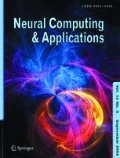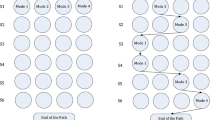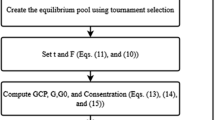Abstract
Cloud computing is an emerging distributed system that provides flexible and dynamically scalable computing resources for use at low cost. Task scheduling in cloud computing environment is one of the main problems that need to be addressed in order to improve system performance and increase cloud consumer satisfaction. Although there are many task scheduling algorithms, existing approaches mainly focus on minimizing the total completion time while ignoring workload balancing. Moreover, managing the quality of service (QoS) of the existing approaches still needs to be improved. In this paper, we propose a novel algorithm named MGGS (modified genetic algorithm (GA) combined with greedy strategy). The proposed algorithm leverages the modified GA algorithm combined with greedy strategy to optimize task scheduling process. Different from existing algorithms, MGGS can find an optimal solution using fewer number of iterations. To evaluate the performance of MGGS, we compared the performance of the proposed algorithm with several existing algorithms based on the total completion time, average response time, and QoS parameters. The results obtained from the experiments show that MGGS performs well as compared to other task scheduling algorithms.














Similar content being viewed by others
References
Liu XF, Zhan ZH, Deng JD et al (2018) An energy efficient ant colony system for virtual machine placement in cloud computing. IEEE Trans Evol Comput 22(1):113–128
Zhou Z, Abawajy J, Chowdhury M, Hu Z et al (2017) Minimizing SLA violation and power consumption in cloud data centers using adaptive energy-aware algorithms. Future Gener Comput Syst (FGCS) 86(6):836–850
Zhou Z, Abawajy J, Chowdhury M, Li F, Hu Z, Li K et al (2018) Fine-grained energy consumption model of servers based on task characteristics in cloud data center. IEEE Access 6(1):27080–27090
Xie G, Zeng G, Jiang J, Fan C, Li R, Li K (2016) Energy management for multiple real-time workflows on cyber-physical cloud systems. Future Gener Comput Syst 27(7):1915–1928
Wu KC, Liu WY, Wu SY (2018) Dynamic deployment and cost-sensitive provisioning for elastic mobile cloud services. IEEE Trans Mob Comput 17(6):1326–1338
Hao L, Kenli L, Jiyao A, Keqin L (2018) MSGD: A novel matrix factorization approach for large-scale collaborative filtering recommender systems on GPUs. IEEE Trans Parallel Distrib Syst 29(7):1530–1544
Kumar M, Mao YH, Wang YH, Qiu TR, Yang C, Zhang WP (2017) Fuzzy theoretic approach to signals and systems: static systems. Inf Sci 418:668–702
Huang SC, Jiau MK, Lin CH (2015) A genetic-algorithm-based approach to solve carpool service problems in cloud computing. IEEE Trans Intell Transp Syst 16(1):352–364
Karimi MB, Isazadeh A, Rahmani AM (2017) QoS-aware service composition in cloud computing using data mining techniques and genetic algorithm. J Supercomput 73(4):1387–1415
Pizzuti C (2012) A multiobjective genetic algorithm to find communities in complex networks. IEEE Trans Evol Comput 16(3):418–430
Manasrah AM, Ali HB (2018) workflow scheduling using hybrid GA-PSO algorithm in cloud computing. Wireless Commun Mobile Comput 2018(3):1–16
Chitra OL, Venkatesh P et al (2011) Modified genetic algorithm for multiobjective task scheduling on heterogeneous computing system. Int J Inf Technol Commun Converg 2(1):146–158
Etminani K, Naghibzadeh M (2007) A min-min max-min selective algorithm for grid task scheduling. In: 3rd IEEE/IFIP International conference in central asia on internet, pp 1–7
Moreno R, Alonso-Conde AB (2004) Job scheduling and resource management techniques in economic grid environments. In: Grid computing, Santiago de Compostela, pp 25–32
Zhou Z, Hu Z (2014) Task scheduling algorithm based on greedy strategy in cloud computing. Open Cybern Syst J 8(1):111–114
Mao Y, Chen X, Li X (2014) Max–Min task scheduling algorithm for load balance in cloud computing. Proc Int Conf Comput Sci Inf Technol 225:457–465
Masdari M, Salehi F, Jalali M et al (2016) A survey of PSO-based scheduling algorithms in cloud computing. J Netw Syst Manag 25(1):122–158
Almaamari A, Omara FA (2015) Task scheduling using PSO algorithm in cloud computing environments. Int J Grid Distrib Comput 8(5):245–256
Yang Z, Qin X, Li W et al (2013) Optimized task scheduling and resource allocation in cloud computing using PSO based fitness function. Inf Technol J 12(23):7090–7095
Otero FEB, Freitas AA, Johnson CG (2012) Inducing decision trees with an ant colony optimization algorithm. Appl Soft Comput 12(11):3615–3626
Liu X, Yi H, Ni Z (2013) Application of ant colony optimization algorithm in process planning optimization. J Intell Manuf 24(1):1–13
Dai Y, Lou Y, Lu X (2015) A task scheduling algorithm based on genetic algorithm and ant colony optimization algorithm with multi-QoS constraints in cloud computing. In: IEEE international conference on intelligent human-machine systems and cybernetics, pp 428–431
Yuan H, Bi J, Zhou MC et al (2017) WARM: workload-aware multi-application task scheduling for revenue maximization in SDN-based cloud data center. IEEE Access 6(1):645–657
Yahyaoui H, Maamar Z, Lim E et al (2013) Towards a community-based, social network-driven framework for Web services management. Future Gener Comput Syst 29(6):1363–1377
Calheiros RN, Ranjan R, Beloglazov A et al (2011) CloudSim: a toolkit for modeling and simulation of cloud computing environments and evaluation of resource provisioning algorithms. Softw Pract Exp 41(1):23–50
Zhou Z, Hu Z, Yu J, Abawajy J, Chowdhury M (2017) Energy-efficient virtual machine consolidation algorithm in cloud data centers. J Cent South Univ 24(10):2331–2341
Acknowledgement
This work was supported by the National Natural Science Foundation of China (Nos. 61572525 and 61772088), the China Postdoctoral Science Foundation (No. 2018M642974), the Scientific research project of education department of hunan province, the Natural Science Foundation of Hunan Province (No. 2019JJ50689) and the Science and Technology Plan Project of Changsha city (No. k1705036).
Author information
Authors and Affiliations
Corresponding author
Ethics declarations
Conflict of interest
The authors declare that they have no conflict of interest.
Additional information
Publisher's Note
Springer Nature remains neutral with regard to jurisdictional claims in published maps and institutional affiliations.
Zhou Zhou and Huaxi Zhu are co-first authors.
Rights and permissions
About this article
Cite this article
Zhou, Z., Li, F., Zhu, H. et al. An improved genetic algorithm using greedy strategy toward task scheduling optimization in cloud environments. Neural Comput & Applic 32, 1531–1541 (2020). https://doi.org/10.1007/s00521-019-04119-7
Received:
Accepted:
Published:
Issue Date:
DOI: https://doi.org/10.1007/s00521-019-04119-7




